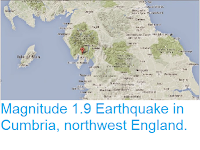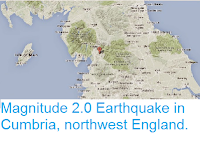The British Geological Survey recorded
a Magnitude 3.2 Earthquake at a depth of about 4 km, roughly 6 km to the south of the town of Cockermouth in Cumbria, England, slightly before 7.35 am GMT on Tuesday 28 February 2018. There are no reports of any damage or
injuries associated with this event, and nor would they be expected from
such a small event, though it was felt in the area around Whitehaven and Wokington.
The approximate location of the 28 February 2018 Cockermouth Earthquake. Google Maps.
Earthquakes
become more common as you travel north and west in Great Britain, with
the west coast of Scotland being the most quake-prone part of the island
and the northwest of Wales being more prone to quakes than the rest of
Wales or most of England. However, while quakes in southern England are
less frequent, they are often larger than events in the north, as
tectonic pressures tend to build up for longer periods of time between
events, so that when they occur more pressure is released.
The
precise cause of Earthquakes in the UK can be hard to determine; the
country is not close to any obvious single cause of such activity such
as a plate margin, but is subject to tectonic pressures from several
different sources, with most quakes probably being the result of the
interplay between these forces.
Britain
is being pushed to the east by the expansion of the Atlantic Ocean and
to the north by the impact of Africa into Europe from the south. It is
also affected by lesser areas of tectonic spreading beneath the North
Sea, Rhine Valley and Bay of Biscay. Finally the country is subject to
glacial rebound; until about 10 000 years ago much of the north of the
country was covered by a thick layer of glacial ice (this is believed to
have been thickest on the west coast of Scotland), pushing the rocks of
the British lithosphere down into the underlying mantle. This ice is
now gone, and the rocks are springing (slowly) back into their original
position, causing the occasional Earthquake in the process.
Witness
accounts of Earthquakes can help geologists to understand these events,
and the structures that cause them. If you felt this quake, or were in
the area but did not (which is also useful information) then you can
report it to the British Geological Survey here.
See also...
Follow Sciency Thoughts on Facebook.









